Exiled prince calls for 'final action' against Iran's rulers
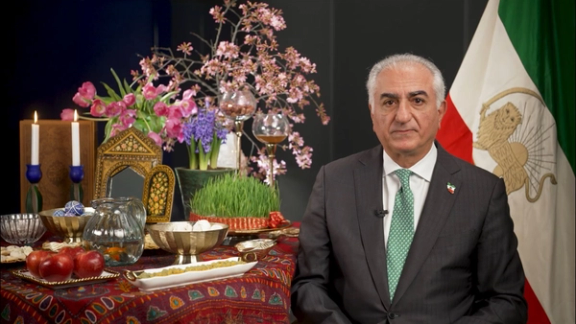
Iran's exiled prince Reza Pahlavi urged all Iranians on the eve of their New Year to join forces to topple a ruling system that he said is on the verge of collapse.

Iran's exiled prince Reza Pahlavi urged all Iranians on the eve of their New Year to join forces to topple a ruling system that he said is on the verge of collapse.
“We enter the New Year at a time when the Islamic Republic is at its weakest and most ineffective," Pahlavi said in a video address to Iranians posted on X on Wednesday.
"A unique window of opportunity has emerged for major change and the liberation of Iran from religious tyranny," he added, citing the blows to Tehran's regional influence during the conflict with Israel in the year past.
"The coming year is the year of organizing for the final move."
The New Year in Iranian calendar begins on March 20th, when state media broadcast official address by Iran's president and supreme leader---who sets the agenda for the year ahead, usually with a phrase summing it up.
Pahlavi's message on the eve of the New Year is aimed to cement his position as a prominent opposition figure whose supporters see as Iran's best hope to undo the revolution that ousted his father Mohammad Reza in 1979.
"In the past year, at your call, I accepted the responsibility of leading the national revolution and the transition period," Pahlavi said in his address, calling for dissidents to put aside their differences.
Those supporting the exiled prince consider him to be peerless and above political groupings and coalitions. His critics among the opposition question this assertion and accuse Pahlavi's supporters of stifling debate by attacking those dissidents who do not follow him or criticize his father, the last Shah of Iran.
Pahlavi appeared to address this rift in his message.
"At the start of this new year, I urge all of you, my dear compatriots, to use this occasion to be kinder to one another and to stand more united against our common enemy—the Islamic Republic," he said.
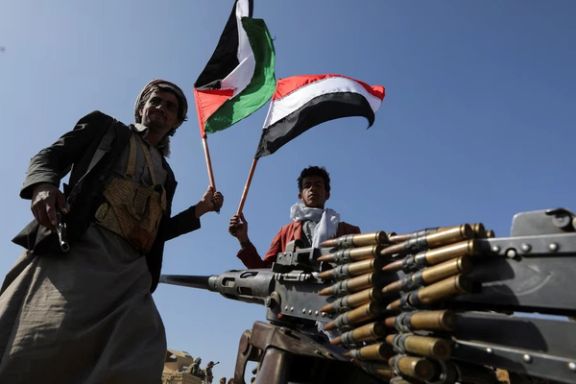
US president Donald Trump says it's not enough for Iran to reduce its support of Houthis and all arms provisions must end, citing reports that Tehran has rolled back its supplies to the Yemen group.
"Reports are coming in that while Iran has lessened its intensity on Military Equipment and General Support to the Houthis, they are still sending large levels of Supplies," Trump posted on TruthSocial on Wednesday. "Iran must stop the sending of these Supplies IMMEDIATELY."
The social media announcement comes a few days after another post in which he said Tehran will be held responsible for Houthi attacks and threatened the theocracy with "dire" consequences.
"Let the Houthis fight it out themselves," Trump's Wednesday message reads. "Either way they lose, but this way they lose quickly ... It’s not even a fair fight, and never will be. They will be completely annihilated!"
Trump on Saturday ordered large-scale military strikes against dozens of targets in Yemen controlled by Tehran-backed Houthi armed group, saying the attacks aimed at ensuring freedom of navigation through shipping lanes the militants have targeted.
Fresh US air strikes hit Yemen on Monday, the Houthis' Al Masirah TV reported. The Houthi-run health ministry said on Sunday that at least 53 people were killed in the attacks.
At a Pentagon press conference on Monday, lieutenant general Alexus Grynkewich told reporters that military casualties among the Houthis were in the dozens but there were no indications of civilian casualties.
Shortly after Israel's incursion into Gaza triggered by a Hamas attack on Oct. 7, 2023, the Shi'ite militant group which seized control of much of Yemen started missile and drone strikes against commercial and military vessels in the Red and Arabian Seas.
They described the effort as a blockade in solidarity with the Palestinian people.
Iran and the Houthis have denied close military coordination but weapons experts have linked the Yemeni fighters' advanced arsenal of anti-ship and ballistic missiles to Iranian technology.
US forces have been locked in their most intense naval combat since World War II with the Houthis but have yet to constrain the maritime attacks.
As ceasefires have taken hold pausing combat between Israel and its badly bludgeoned Hamas and Hezbollah militant adversaries, the Houthis have become the vanguard of Tehran's network of armed affiliates in the Middle East.
The Trump administration views their continued harassment of commercial shipping as an obstacle to his fight to bring down prices for US consumers and continued but largely ineffectual targeting of US forces as a nuisance.
"Iran has played “the innocent victim” of rogue terrorists from which they’ve lost control, but they haven’t lost control," Trump said.
Trump this month demanded Iran agree new deal over its nuclear program or face military attack - an overture rejected by Iran's Supreme Leader as bullying.
Ali Khamenei warned Washington would come off worst in any confrontation, insisting that Iran had not been weakened by over a year of direct and proxy conflict with Israel.
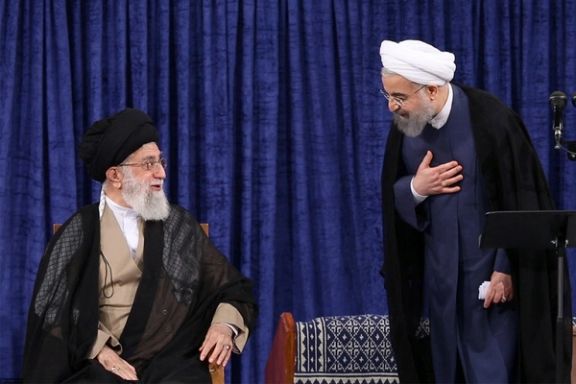
Former President Hassan Rouhani has acknowledged that his administration came close to reviving the 2015 nuclear deal under Biden, but Tehran’s internal divisions prevented the agreement.
"Biden’s election was a golden opportunity for the Islamic Republic," Rouhani said Tuesday in an interview with Iran newspaper. "We could have restored the nuclear deal in 2021, but due to political disputes over who would take the presidency next, that opportunity was lost. Now, our situation is harder than ever."
According to Rouhani, who served from 2013 to 2021, his top negotiator at the time, Abbas Araghchi—now Iran’s foreign minister—had reached a framework agreement for reviving the deal with Robert Malley, President Joe Biden’s special envoy for Iran.
Malley, who led US efforts to restart nuclear negotiations, was placed on unpaid leave in April 2023 amid an FBI investigation into his handling of classified information. A Wall Street Journal report in September said that Malley had clicked on a phishing link that compromised his personal email and may have moved classified meeting notes to an unauthorized account.
During Malley’s tenure, the Biden administration informally eased enforcement of US oil sanctions on Iran which were imposed by President Donald Trump in 2018. Iranian oil exports, which had dropped to 250,000 barrels per day in 2019 under Trump’s maximum-pressure campaign, surged to nearly 2 million barrels per day during Biden’s presidency.
Rouhani also said that Malley and Araghchi’s agreement would have ensured not only a US return to the nuclear deal but also the reversal of Trump-era policies, including sanctions on Iran’s Supreme Leader’s office and the designation of the Islamic Revolutionary Guard Corps (IRGC) as a terrorist organization.
Rouhani, who according to Iranian laws could run for a third term, was succeeded by hardliner cleric Ebrahim Raisi in June 2021. His administration resumed talks with JCPOA signatories, but negotiations collapsed after Russia’s invasion of Ukraine.
The former president blamed internal power struggles for the failure of the negotiations. “Some were more concerned about preventing my administration from achieving success than about the national interest,” he said.
Rouhani’s latest remarks come after he suggested last week that Supreme Leader Ali Khamenei’s firm rejection of direct negotiations with Washington might not be absolute—despite Khamenei himself maintaining otherwise. Nevertheless, with Trump back in the White House, Rouhani acknowledged that engaging with Washington will be even more challenging. “Working with Trump is extremely difficult and complex,” he said. “I hope our officials find a way forward.”
As tensions between the US and Iran remain high, Rouhani’s comments hint at the differing views within Tehran’s leadership on how to approach Washington, both in the past and moving forward.
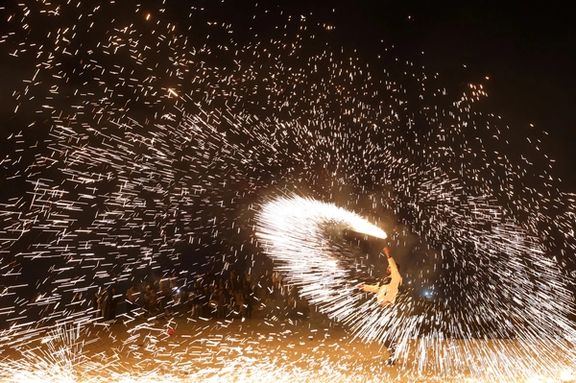
Iranians across the country defied government warnings and took to the streets en masse on Tuesday night in celebration of the ancient festival of Charshanbe Suri in spite of a huge security presence.
Celebrations of the ancient festival were marred by clashes with security forces who came to blows with revellers and reports that 19 had died and 5,000 were left injured.
There are no details on whether any of the injuries were caused by security forces who used tear gas and force to disperse crowds in some areas and most incidents occurring in the provinces of Tehran, West Azarbaijan, and East Azarbaijan.
Videos circulating on social media showed large crowds gathering in cities like Tehran, Karaj and Rasht, with bonfires illuminating the night sky and the sounds of music and cheering filling the air.
The festival, marked by jumping over bonfires and setting off fireworks, is a deeply rooted cultural tradition, but it has increasingly become a flashpoint for defiance against the Islamic Republic's restrictions.
The celebrations went ahead with full force in spite of the government warnings against celebrations, young people seeing it as an expression of their cultural identity and a way to challenge authority.
Iranian authorities, including the country’s deputy police commander, have issued warnings of a decisive response to any violations during Nowruz celebrations, as security forces deploy in Kurdish regions to disrupt festivities. The warnings coincide with the IRGC banning official celebrations in Ilam province.
The confluence of Nowruz and Ramadan has heightened tensions, with authorities emphasizing religious adherence.
In the wake of the 2022 uprising, the festival has been turned into an ever growing display of defiance, and in some cases, open protests against the government.
On Tuesday, protests broke out in cities such as Tehran, Karaj, Mashhad and Isfahan, with young Iranians setting fire to images of Supreme Leader Ali Khamenei.
The authorities' attempts to discourage the celebrations have also drawn criticism.
"The efforts made to forget the Charshanbe Suri celebration have made the city unsafe for people," said Jalal Maleki, spokesman for the Tehran Fire Department, calling for designated spaces to ensure public safety.
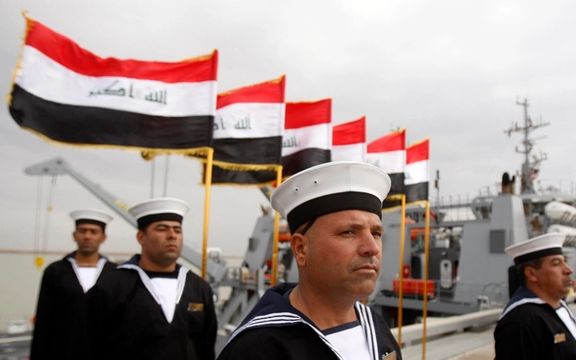
Iraqi naval forces seized an unidentified vessel in the Persian Gulf suspected of fuel smuggling, detaining the Iranian captain and ten Indian and Iraqi crew, the navy said Tuesday.
The vessel, intercepted in Iraqi territorial waters, was towed to Umm Qasr naval base for investigation and the crew was handed over to local police. Its name was not visible in a picture released by the navy.
Fuel smuggling is common in the Persian Gulf, where heavily subsidized fuel is sold on the black market to buyers across the region, but Iraqi seizures are relatively rare.
In December, Iran's President Masoud Pezeshkian said that 20 to 30 million liters of fuel are smuggled out of the country daily, calling it a catastrophe amid the country's energy crisis.
Pezeshkian did not specify the destinations but fuel smuggling in Iran often involves routes to neighboring countries where fuel prices are significantly higher.
In December, Reuters reported that a sophisticated oil smuggling network generating at least $1 billion a year for Iran and its proxies has flourished in Iraq since Prime Minister Mohammed Shia al-Sudani took office in 2022.
Earlier this month Iranian authorities discovered and sealed four illegal taps on a major oil pipeline near the southern city of Bandar Abbas.
Last month, Iran said it dismantled 130 fuel smuggling depots and arrested 41 key suspects in Tehran province.
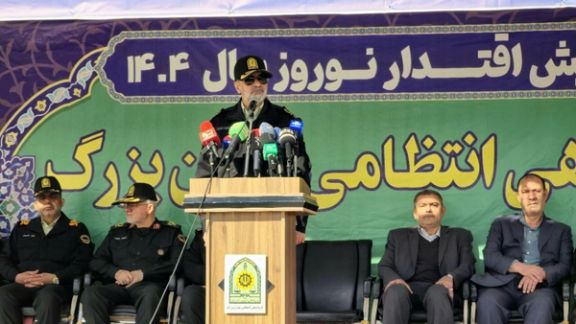
Iran's police chief said the new Iranian year starting on Friday will mark a significant push towards sealing the country's borders and intensifying the fight against crime.
General Ahmad-Reza Radan, the national police commander, announced on Wednesday that enhanced equipment and operational capabilities would enable a leap in border security for the Iranian year 1404.
"The border and its closure were among the challenges for the police in 1403," Radan stated, promising a decisive shift in the coming year without elaborating on details.
Up to 8 million Afghans have illegally entered Iran since 2021, compounding the country's economic challenges such as shortage of energy and water. The authorities have not been able or unwilling to commit resources to protecting the long border.
Last April, Deputy Police Chief Qasem Rezaei said that the construction of a border wall with Afghanistan would "help prevent drug trafficking, the movement of outlaws, and terrorist infiltrations."
The border fortification plan, which entails building a four-meter concrete wall, along with barbed wire, fencing, and proper roads along the northwestern and eastern borders, is scheduled for completion within the next two years.
In addition to border security, Radan outlined key priorities for the police in the coming year, 1404, including, reducing traffic violations, combating theft and the trade of stolen goods and leveling up the fight against drugs.
"1404 will be a bitter year for thieves and those who deal in stolen goods," Radan warned, as crime has increased amid the current economic crisis.
Radan detailed the extensive deployment of security forces during the Nowruz 1404 Exercise which showcased the police's readiness for the Iranian New Year holidays.
"More than 16,000 patrols, 20 helicopters, dozens of drones, and over 250,000 police personnel will secure the country from the borders to the cities," he said.
Tehran's police chief, General Abbas Ali Mohammadian, reported a 19% decrease in thefts in the capital during the past year, attributing it to increased police activity. He also noted a rise in emergency call responses and significant seizures of narcotics.
Iranian police called for public cooperation and adherence to Islamic fasting rules during the coinciding Nowruz and Ramadan periods, emphasizing that celebrations must align with Islamic rules.
While Nowruz is not officially banned, its pre-Islamic roots have long been a point of contention among religious hardliners who dominate key centers of power. These groups often discourage traditional Persian festivals, viewing them as remnants of the past that glorify pre-Islamic Persian history.
In previous years, authorities have attempted to limit gatherings at historically significant sites such as Persepolis and the tomb of Cyrus the Great in Pasargadae, sometimes leading to clashes with participants.